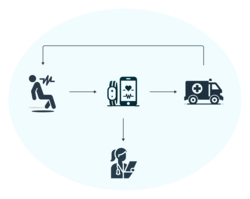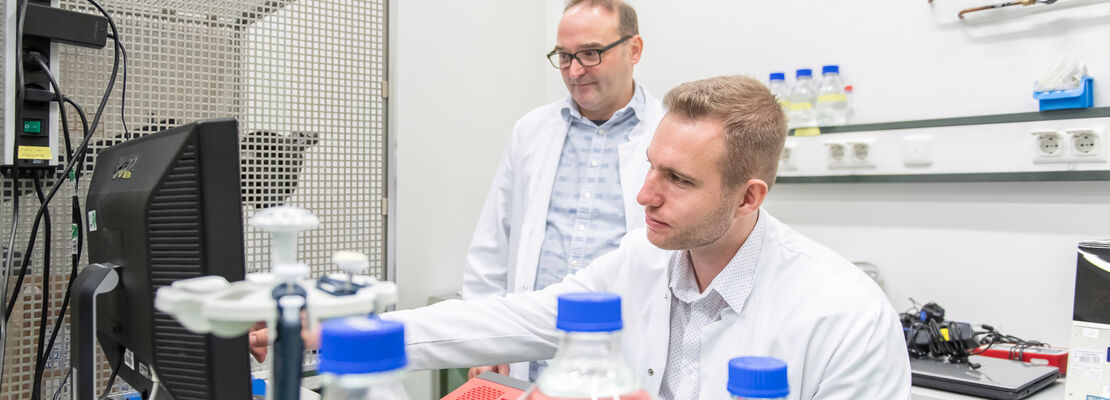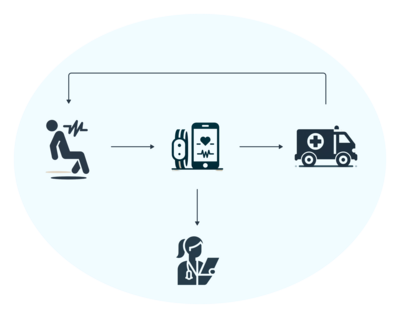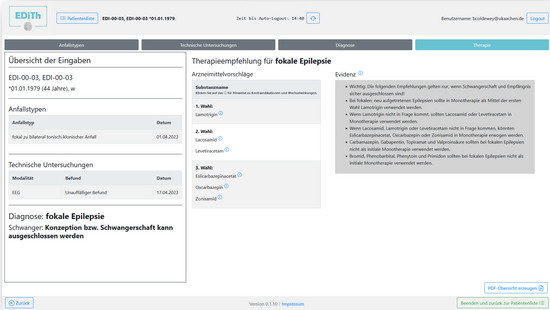Research projects and techniques
Recognizing that up to 50% of epileptic seizures are undetected and therefore undocumented, our working group is pioneering the creation of EEG-independent seizure detection systems. We are focused on designing a discreet, wearable device that patients can comfortably wear under their clothing. This device is intended to sync with a smartphone app, providing objective measurements of seizure activity. In a novel approach to comprehensive care, this technology is being developed in tandem with a feature to monitor depressive symptoms, which often accompany epilepsy. The algorithms behind these tools leverage diverse methods of artificial intelligence to ensure precision in detecting seizures and monitoring mental health, thus offering a dual advantage. This initiative promises a more holistic treatment strategy for epilepsy, acknowledging the critical interplay between neurological events and mental well-being.
Clinical Decision Support Systems (CDSS) are a transformative force in modern healthcare, offering vital for medical professionals, especially in complex fields like epilepsy care. These digital systems harness vast repositories of medical guidelines, expert knowledge, and pharmacological data—resources that may be beyond the immediate recall of even seasoned practitioners, let alone those without specialized training in neurology.
In the realm of epilepsy, where diagnostic and therapeutic decisions are nuanced and patient-specific, a CDSS serves as an indispensable tool. It filters and consolidates pertinent information, tailoring it to the unique parameters of each case. This not only aids in accurately diagnosing the type of epilepsy but also guides the selection of an optimal therapeutic strategy, considering the intricacies of pharmacology that can influence treatment efficacy and patient safety.
By integrating a CDSS into epilepsy management, clinicians can make more informed decisions backed by a comprehensive, case-adapted synthesis of the latest medical knowledge. This system can streamline workflows, reduce the likelihood of human error, and improve patient outcomes.

Viele Epilepsiepatient/innen leiden unter komorbid-auftretenden depressiven Symptomen, wie z. B. unter Freud- und Interessenverlust. Dieser Zustand geht häufig mit einer unvollständigen Dokumentation von epileptischen Anfallsereignissen, da diese z.B. sehr milde oder nachts ablaufen, und in der Folge mit einer unzureichenden anfallssupprimierenden Behandlung einher.
Die Studie Assoziation von Anfallsfrequenz und depressiven Symptomen bei Patienten mit Epilepsie untersucht, ob die Anfallsfrequenz bei Epilepsiepatient/innen mit depressiven Symptomen in Verbindung steht. Weiterhin soll geprüft werden, ob die Art der Epilepsie und/oder die medikamentöse Therapie die depressiven Symptome mit beeinflusst. Gleichzeitig sollen Biomarker für die Erfassung depressiver Symptome entwickelt werden.
Dazu werden der MoniKit-Anfallsdetektor zur automatisierten Erkennung epileptischer Anfallsereignisse und die MoniKit-App als elektronisches Anfallstagebuch von den Studienteilnehmenden genutzt. Mit der iTrack Depression App dokumentieren die Patient/innen hingegen depressive Symptome. Zusätzlich erfolgt die Sammlung von Biodaten, wie z. B. der Herzfrequenz, durch die Verwendung einer Fitness-Armbanduhr. Die Nutzung der subjektiven Angaben aus der MoniKit und iTrack Depression App, sowie der objektiven Daten des MoniKit Anfallsdetektors und der Fitnessuhr, ermöglichen eine systematische und fachübergreifende Betrachtungsweise der Krankheitsbilder Epilepsie und Depression.
Die Studie wird durch Fördermittel des Bundesministeriums für Bildung und Forschung (BMBF) finanziert.
















